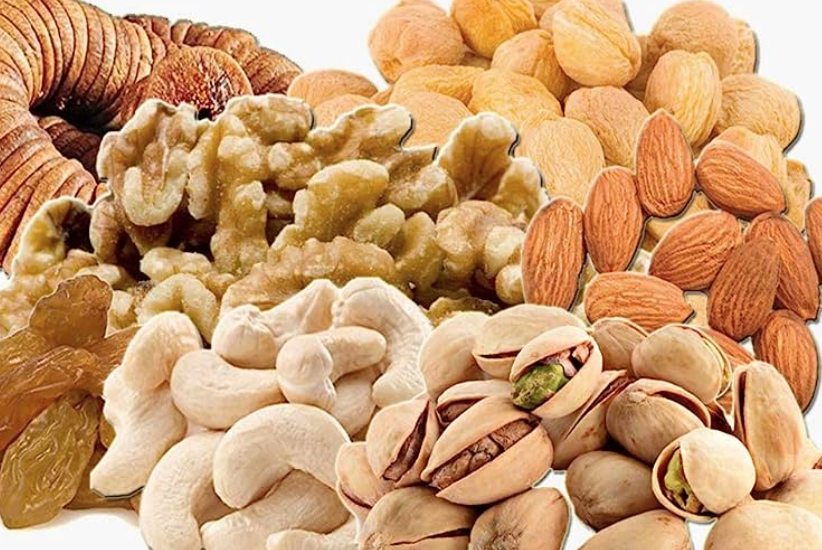Dry fruits, also known as dried fruits, are fruits that have been subjected to a drying process to remove most of their water content, leaving behind a nutrient-dense and concentrated snack. This preservation method allows fruits to have a longer shelf life while retaining many of their natural flavors and nutrients. Some common dry fruits include:
- Raisins: Dried grapes, available in various colors like black, golden, and green. They are sweet and commonly used in baking and cooking.
- Apricots: Dried apricots are sweet, chewy, and orange in color. They are rich in vitamins A and C and are a good source of fiber.
- Dates: Sweet and sticky dried fruits from date palm trees. Dates are often used in desserts and as a natural sweetener.
- Figs: Dried figs are naturally sweet and have a chewy texture. They are high in fiber, vitamins, and minerals.
- Prunes: Dried plums, known for their laxative properties due to their high fiber content. They are also rich in antioxidants.
- Cranberries: These dried berries are slightly tart and often used in baking and trail mixes.
- Mangoes: Dried mangoes are sweet and tangy, offering a tropical flavor.
- Pineapple: Dried pineapple is a sweet and tropical treat.
- Apples: Dried apple slices are a popular snack, often seasoned with cinnamon.
- Cherries: Dried cherries are sweet and tangy, commonly used in baking and salads.
Dry fruits are a convenient and healthy snack option, providing a concentrated source of vitamins, minerals, fiber, and antioxidants. However, it’s essential to consume them in moderation as they can be high in natural sugars and calories. Always check the packaging for added sugars or preservatives, as some commercially available dried fruits may have these additives.
Dry fruits are considered important to eat due to their numerous health benefits and nutritional value. Here are some reasons why incorporating dry fruits into your diet can be beneficial:
- Rich in Nutrients: Dry fruits are nutrient-dense, meaning they contain a concentrated amount of vitamins, minerals, and essential nutrients. They are a good source of potassium, iron, calcium, magnesium, and various vitamins, depending on the specific fruit.
- Fiber Content: Dried fruits are an excellent source of dietary fiber, which is essential for digestive health. Fiber aids in regulating bowel movements, preventing constipation, and promoting a healthy gut.
- Antioxidants: Many dry fruits are rich in antioxidants, such as flavonoids and polyphenols. These compounds help neutralize harmful free radicals in the body, reducing oxidative stress and potentially lowering the risk of chronic diseases.
- Energy Boost: Due to their natural sugar content and carbohydrate composition, dry fruits can provide a quick and sustained energy boost, making them a great snack for athletes or people engaging in physical activities.
- Heart Health: Some dry fruits, like raisins, prunes, and dried apricots, have been associated with potential cardiovascular benefits. They may help lower bad cholesterol levels, support heart health, and reduce the risk of heart disease.
- Weight Management: Despite being calorie-dense, research suggests that including moderate amounts of dry fruits in the diet may help with weight management. The fiber and nutrients in dry fruits can promote satiety and reduce overall calorie intake.
- Easy to Store and Carry: Dry fruits have a longer shelf life compared to fresh fruits, making them a convenient and portable snack option. They are perfect for on-the-go or as a healthy travel snack.
- Alternative to Unhealthy Snacks: When you have a craving for something sweet or a snack, opting for dry fruits over sugary and processed snacks can be a healthier choice.
- Side Effects of Vitamin D Shots and Their Hidden Link With Blocked Arteries

- What is Share Market? Complete Guide with History, Working & Benefits

- A Visual Journey Through Studio Ghibli’s Magical World

Additionally, some commercially available dried fruits may contain added sugars or preservatives, so it’s best to read the labels and choose options without added ingredients. For maximum health benefits, it’s always a good idea to incorporate a variety of fruits, including fresh and dried, as part of a balanced diet.




